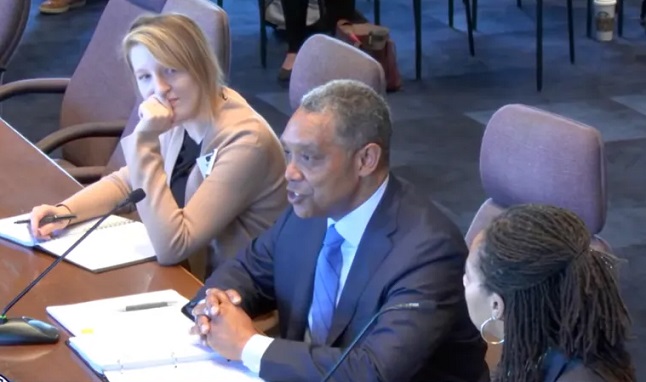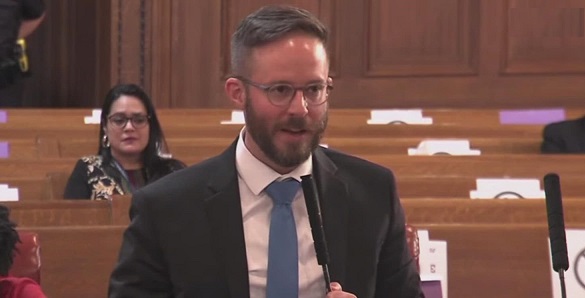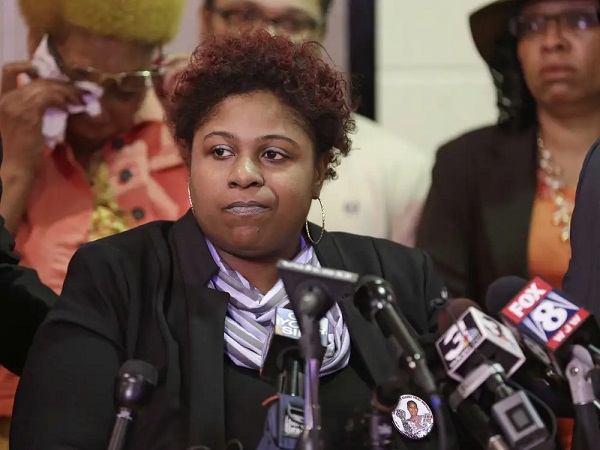Council Trust Between Community And Police Will Enhance Public Safety!
FEATURED PHOTO: KARL RACINE FORMER AND FIRST ELECTED ATTORNEY GENERAL OF WASHINGTON D.C. IS THE NEW HEAD OF CLEVELAND POLICE MONITORING TEAM

ClevelScene.com. By Mark Oprea, Posted June 13th 2023
But, eight years in, the Cleveland police department has a ways to go in reaching compliance with mandated goals
Karl Racine, the new head of the Cleveland Police Monitoring Team, met with City Council for the first time on Wednesday.
One month after City Hall chose its newest overseer of its consent decree, the new Cleveland Police Monitoring Team met with members of council’s safety committee on Wednesday to discuss the next six months of gradual progress towards bettering the city’s police force.
Karl Racine, the head of Washington, D.C.-based Hogan Lovells, tapped to head the monitoring team, entertained two hours worth of stiff and open-ended questioning, ranging from inquiries regarding compliance updates in the team’s March 2023 report to what exactly are compliance updates in the first place.
Since 2014, when the Feds intervened with the Cleveland Division of Police, the city has budgeted roughly $1 million for an independent group to oversee progress of 340 specific points of necessary improvement, from how body cameras are worn to how officer misbehavior is reviewed internally. The consent decree also required the formation of a Community Police Commission, which the city finalized in January.
That team, now lead by Racine, writes up semi-annual reports detailing CPD’s progress, in four levels of approval: General Compliance, Operational Compliance Partial Compliance and Non-Compliance.
According to the March report, which tracks progress from July to December 2022, 13 percent of the Consent Decree’s demands—44 paragraphs, as Racine calls them—are still non-compliant, or demands yet to be certified by the monitoring team. A bulk of these necessities are a police intervention program, a field training program and officer performance evaluations. Mayor Bibb’s recent hiring of Marcus Perez, the new admin of the Office of Professional Standards, was a check off the list.

Racine, the former attorney general of D.C. who’s helped guide 30 consent decrees, ensured council that he’s well aware of Cleveland’s current policing situation, one battered by an officer shortage and a gun violence spikes.
“As you know, we’re nearly eight years into this consent agreement, and I know that this weighs heavily on Cleveland,” Racine told the committee. He went on to acknowledge a montage of Cleveland police eyesores, from the 2012 “137 shots” tragedy to the 2013 pepper-spraying of a mentally-ill suspect. “We are folks who serve the public,” Racine added, “and we take this mission, this responsibility, as a public service.”
It’s such severity why Racine, who’s been visiting Cleveland, he said, since February, took time to point out some flimsiness in the monitoring team’s budget, which has remained relatively consistent since its first report in 2016.
“If you look at other monitorships in regards to cities that have gone through certain processes,” he said, “that $1.1 million is actually on the lower end of the range. That doesn’t make the burden completely lighter. But those are facts.”
Ward 17 Councilman Charles Slife rebutted by reminding Racine that, in essence, Cleveland is a lot less well-off than the bigger cities Racine’s worked in.
“It’s reasonable to remind ourselves that there are obligations with respect to federal courts as to how we fund our police,” Slife said, before criticizing the city’s streets and parks quality. “But we’re a pretty cash-poor municipality compared to many large city governments across the country.”
For the committee as a whole, questioning of Racine and crew—which included interim monitor Ayesha Bell Hardaway, community engagement director Charles See and Urban Studies professor Ronnie Dunn—leaned a lot on monitor report basics, on how many decree requirements there were (“340?”, “346?”, “372?”), what team members are paid (“$250/hour”) and reminding Racine about Cleveland’s homicide spike and epidemic of youth-centered violence.

A lot of the back-to-introductions seemed to infuriate Samaria Rice, the mother of Tamir Rice, who was sitting in the public comment section since the meeting convened at 10 a.m.
In an interview around noon, Rice, whose late son’s killing in Cudell by CPD in 2014 exacerbated the call for Cleveland’s federal oversight, lambasted the three council members—Danny Kelly, Deborah Gray and Joe Jones—that arrived late, along with the perceived ignorance of a decree that’s been around for almost a decade.
“It’s been eight years! Eight years how you don’t know what’s going on, and you asking the same question over and over again, but in different scenarios,” Rice said in a fury, standing outside Council Chambers. “You disrespected the modern people, and you’re not prepared. You’re walking in all late. You’re not making eye contact [with Racine] when you want to. Not really paying attention, you know what I’m saying? Not paying attention to what’s going on. And that’s frustrating.”
In the eight years that she’s grown the Tamir Rice Foundation, a nonprofit designed to deter kids and teenagers from gun violence, Rice said she’s become more appalled at the city’s lack of financial support for her cause.
She said, the lack of “clear” change from the decree, and the cold-shouldering from legacy nonprofits, has culminated in a bitter taste in her month. Tamir’s 21st birthday celebration, Rice said, may be held in Chicago.
“Cleveland has not supported me in keeping Tamir’s legacy alive at all,” she said. “And that’s fact.”
In his pitch to council, Racine chose optimism.
“I have no doubt that when the city gets to a place where it’s obtained and earned substantial compliance with the consent decree,” he told council, “the public will gain trust in law enforcement much greater than in years past. And I have no doubt because the evidence shows this, that where there is trust from the community and law enforcement with each other that enhances public safety.”

